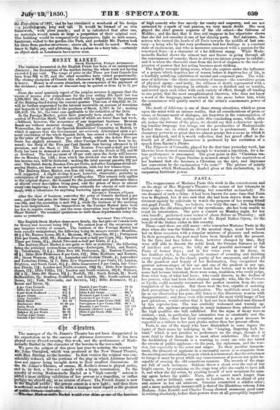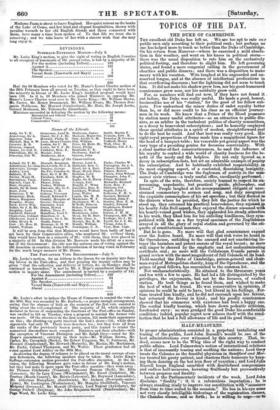PASTA.
The reappeatanee of Madame Pasta this week in the concert-room and on the stage of Her Majesty's Theatre—the scenes of her triumphs in former days—was deeply interesting, but somewhat melancholy. No one dreamed of such a thing: it had been known for some time that Pasta was in England, but it was said that she had been drawn, from her re- tirement mainly by solicitude to watch the progress of her young friend and pupil Parodi. This, we believe, was truly the care; but, breathing once again the old. atmosphere of the °penthouse, she has been unable to resist its intoxication. She gave a concert on Monday night, for her own benefit ; performed some scenes of .einna Bolena on Thursday ; and sang yesterday morning at a concert at the Royal Italian Opera, for the benefit of the Italian exiles in this country.
Those—and there are still many—who remember Madame Pasta in the days when she was the Siddons of the musical stage, must have heard her on these occasions with a singular mixture of pleasure and sadness. In their perceptions the past must have been blended with the present. In the form and face before them, however changed by time, they were still able to discern the noble head, the Grecian features so full of intellect and power, the lofty air and graceful movement of the Pasta of former days ; and in her voice even in its decay, in her faultless style, in her exquisite manner of rounding and finishing every vocal phrase, in the classic purity of her ornaments, and above all in the grandeur and beauty of her declamation, they recognized the greatest actress-singer of her age and one of the greatest in any age. Even among those who had never heard her before, and to whom her name had become historical, there were some, doubtless, who could judge, from what WttS, of what had been ; who could. discern, in the decline of her powers, what had been their original strength; who, like the Cuviers or Lyells, could mentally reconstruct the perfect creation from the con- templation of its remains. But these were the few, capable of assisting their perceptions by a plastic imagination. The multitude must (and, as far as our observation has gone, did) listen to this illustrious woman with disappointment; and those even who retained the most vivid image of her past splendour, would rather that it had not been disturbed and dimmed by this reproduction. She was cordially welcomed and warmly ap- plauded; the applause proceeding in many instances from admiration of the high qualities she still exhibited. But the signs of decay were so evident,—and, in particular, her intonation was so constantly and dis- tressingly false,—that her kind reception must in a great measure be- regarded as a tribute to her past glories rather than her present efforts. Pasta is one of the ninny who have diminished in some degree the lustre of their name by indulging in the "longing, lingering look be- hind," which is not peculiar to performers on the stage, though it is more fatal to their fame than to most other celebrities. The story of the Archbishop of Grenada is a warning to every CM who has tasted the sweets of public applause—to the post, the statesman, and the war- rior, nor, but especially to the actor and singer. To their peculiar tempera- ment, the pleasure of applause in a successful career is so exquisite from the exciting and stimulating way in which it is bestowed, that the reluctance to forego it must be great while any consciousness of powers not quite in- capable of rousing the old sensations remains. The records of the stage are full of such instances. - Siddons threw a cloud over the end of her bright career, by remaining on the stage long after she ought to have left it, and when she did retire, by availing herself of new occasions for com- ing again before the public. Mara, after a career much longer than Pasta's, and as brilliant, came again to London, to be an object of pity and sorrow to her old admirers. Grassini committed a similar error; and a more melancholy instance stal is that of the illustrious veteran John Brahma. John Kemble and Charles Young showed toteamsnota good BOW in retiring absolutely, before their powers were at all perceptibly impaired
Madame Pasta is about to leave England. Her quiet retreat on the banks of the Lake of Como, and her kind and elegant hmpitalities, shown with peculiar warmth to her old English friends and then connected with them, have many a time been spoken of. To that life we trust she is returning; and we take leave of her with a sincere wish that she may long enjoy it.



























 Previous page
Previous page